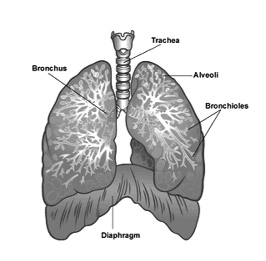By Dr Ritesh Kohli, MD (Internal Medicine Specialist)
What is asthma?
Asthma is a condition that affects the airways of your lungs and your breathing.
Your airways, or breathing tubes, are called bronchial tubes.
When there is an asthma flare-up or attack, the bronchial tubes become inflamed and narrow. There may also be mucus present along with inflammation.
These different changes make it difficult for air to pass through the bronchial tubes and into the lungs, creating problems with breathing.

Asthma symptoms start when allergens or other irritants cause the lining of the airways to swell (become inflamed) and narrow. The muscles around the airways can then spasm, (contract rapidly), causing the airways to narrow even more. When the lining of the airways is inflamed, it produces more mucus. The mucus clogs the airways and further blocks the flow of air. This is called an ‘asthma attack.’
What are the symptoms associated with an asthma flare-up?
The symptoms associated with an asthma flare-up are similar to the common cold, but asthma is not contagious. These symptoms include:
● Wheezing or whistling sound when breathing
● Coughing
● Feeling of tightness in the chest
● Difficulty in breathing and/or shortness of breath
What causes asthma flare-ups?
The causes of flare-ups are called asthma triggers or allergens. Examples may include:
● Tobacco smoke
● Dust
● Perfumes
● Drugs – commonly aspirin
● Colouring agents
● Pollen and grasses
● Animal dander
● Viruses
● Infections
● Mould
● Breathing in cold air
● Pests such as cockroaches
● Exertion
● Emotional stress
IT IS SAD BUT TRUE THAT THERE IS NO PERMANENT CURE FOR ASTHMA
A patient can, however, learn to study the symptoms of this condition well and manage it whenever such a situation arises. The first and foremost thing that an asthma patient needs to be careful about is his environment. He must ensure that he is living in an environment that is free from irritants such as dust, smoke, pollutants, pets, and other allergens. If one insists on living in a clean and green area, an acute asthma flare-up could be averted.
Asthma is treated with different medications depending upon the individual needs of each patient. These options can be in the form of inhalers, pills and liquid medications. Treatment will often depend upon how serious, how often, and how fast the flare-ups occur. Most people with asthma are treated with inhalers. Inhalers deliver a small dose of drug directly to the airways. This dose is enough to treat the airways. During an acute flare-up, bronchodilators are usually used to relax the muscles of the bronchial tubes and allow air to pass more freely into your airways. Chronic asthma is treated with medications that reduce inflammation of the bronchial tubes. Your doctor may also recommend an exercise plan to improve the health of your lungs and overall body. It is important to review any exercise plan with your doctor before beginning with any exercise.
Can flare-ups be prevented?
Many asthma flare-ups can be prevented by following your individual asthma management plan prescribed by your doctor:
• Identify and control the asthma triggers to which you are sensitive
• Avoid triggers through environmental controls such as:
* Frequent vacuuming
* Changing air filtres
* Frequent dusting
* Keeping pets out of bedrooms
* Avoiding smoking at home or in your car
* Cleaning bed linens and pillows
* Getting rid of cockroaches and rats
• Take medications as prescribed
• Flare-ups commonly occur when the maintenance medication plan is not consistently followed.
• Watch for early warning signs of an asthma flare-up
* Signs may occur a couple hours prior to a flare-up:
* Sneezing, wheezing, coughing
* Changes in breathing
* General complaints of not feeling well or of feeling “funny.”
* Changes in your mood or energy level
• Call your doctor when warning signs are present. Your asthma medications and management plan may need to be adjusted.
• Your doctor may recommend use of a peak flow meter, which is a portable device that you blow into like a balloon, to assess the efficiency of your lungs.
Does asthma go away?
There is no once-for-all cure. However, about half of all the children who develop asthma ‘grow out of it’ by the time they are adults. For many adults, asthma is variable with some good spells and some spells that are not so good. Some people are worse in the winter months, and some worsen in the hayfever season. Although not curable, asthma is treatable. Stepping up the treatment for a while during bad spells will often control symptoms.
Some other general points about asthma
• It is vital that you learn how to use your inhalers correctly. In some people, symptoms persist simply because they do not use their inhaler properly, and the drug from the inhaler does not get into the airways properly. See your practice nurse or doctor if you are not sure if you are using your inhaler properly.
See a doctor or nurse if symptoms are not fully controlled, or if they are getting worse. For example, if:
A night time cough or wheeze is troublesome.
Sport is being affected by symptoms.
Your peak flow readings are lower than normal.
You need an inhaler more often than usual.
An adjustment in inhaler timings or doses may control these symptoms.
SEE A DOCTOR URGENTLY IF YOU DEVELOP SEVERE SYMPTOMS that are not eased by an inhaler. In particular, if you have difficulty in talking due to shortness of breath, you immediately need to go to the hospital. You may need emergency treatment with alternative drugs in the hospital. A severe asthma attack can be life-threatening.





